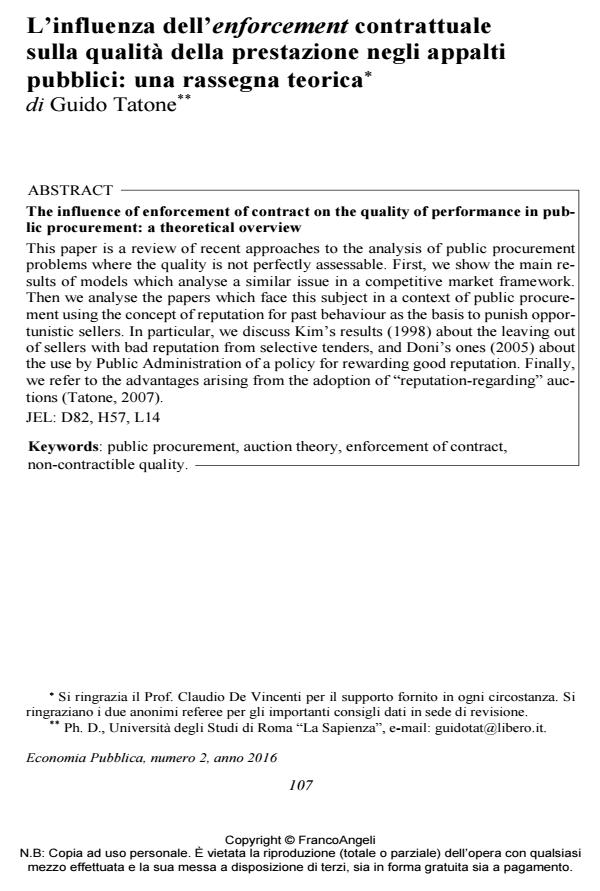The influence of enforcement of contract on the quality of performance in public procurement: a theoretical overview
Journal title ECONOMIA PUBBLICA
Author/s Guido Tatone
Publishing Year 2017 Issue 2016/2 Language Italian
Pages 23 P. 107-129 File size 233 KB
DOI 10.3280/EP2016-002004
DOI is like a bar code for intellectual property: to have more infomation
click here
Below, you can see the article first page
If you want to buy this article in PDF format, you can do it, following the instructions to buy download credits

FrancoAngeli is member of Publishers International Linking Association, Inc (PILA), a not-for-profit association which run the CrossRef service enabling links to and from online scholarly content.
This paper is a review of recent approaches to the analysis of public procurement problems where the quality is not perfectly assessable. First, we show the main results of models which analyse a similar issue in a competitive market framework. Then we analyse the papers which face this subject in a context of public procurement using the concept of reputation for past behaviour as the basis to punish opportunistic sellers. In particular, we discuss Kim’s results (1998) about the leaving out of sellers with bad reputation from selective tenders, and Doni’s ones (2005) about the use by Public Administration of a policy for rewarding good reputation. Finally, we refer to the advantages arising from the adoption of "reputation-regarding" auctions (Tatone, 2007).
Keywords: Public procurement, auction theory, enforcement of contract, non-contractible quality
Jel codes: D82, H57, L14
- Albano G.L., Cesi B., Iozzi A. (2011). Relational Procurement Contracts: A Simple Model of Reputation Mechanism. CEIS Working Paper No. 209.
- Branco F. (1997). The design of multidimensional auctions. Rand Journal of Economics, 28: 63-81.
- Calzolari G., Spagnolo G. (2006). Reputation and Collusion in procurement. The World Congress of the Econometric Society, London 2005.
- Che Y.K. (1993). Design competition through multidimensional auction. Rand Journal of Economics, 24: 668-680.
- Doni N. (2005). L’affidamento mediante gara di contratti pubblici: l’importanza della reputazione. Politica Economica, 21(2): 307-335.
- Doni N. (2006). The importance of reputation in awarding public contracts. Annals of Public and Cooperative Economics, 77(4): 401-429.
- Kelman S. (1990). Procurement and Public Management: the fear of discretion and the quality of government Performance. Washington: American Enterprise Institute.
- Kim I.G. (1998). A model of selective tendering: does bidding competition deter opportunism by contractor? The Quarterly Review of Economics and Finance, 38: 907-925.
- Klein B., Leffler K.B. (1981). The role of market forces in assuring contractual performance. Journal of Political Economy, 89: 615-641.
- Kreps D., Wilson R. (1981). Reputation and imperfect information. Journal of Economic Theory, 27: 253-279.
- Laffont J.J., Tirole J. (1987). Auctioning incentive conctracts. Journal of Political Economy, 95: 921-937.
- Laffont J.J., Tirole J. (1993). A Theory of Incentives in Procurement and Regulation. Cambridge, MA: MIT Press.
- McAfee R.P., McMillan J. (1986). Bidding for contracts: a Principal-Agent analysis. Rand Journal of Economics, 17(3): 326-338.
- Myerson R.B. (1981). Optimal auction design. Mathematics of operations research, 6(1): 58-73.
- Montefiori M. (2004). Reputazione come credibilità per comportamenti passati nei contratti tra acquirenti e fornitore di servizi sanitari. Politica Economica, 20(1): 89-116.
- Riordan M.H., Sappington D.E.M. (1987). Awarding monopoly franchises. American Economic Review, 77: 375-387.
- Rubinstein A., Yaari M.E. (1983). Repeated insurance contracts and moral hazard. Journal of Economic Theory, 30: 74-97.
- Shapiro C. (1983). Premiuns for high-quality products as returns to reputations. Quarterly Journal of Economics, 98: 659-679.
- Spagnolo G., Dini F. (2004). Meccanismi reputazionali e mercati elettronici: problematiche economiche e possibili soluzioni per il public procurement. Quaderni Consip, II.
- Spagnolo G. (2012). Reputation, competition, and entry in procurement. International Journal of Industrial Organization, 30(3): 291-296.
- Spulber D.F. (1990). Auction and contract enforcement. Journal of Law, Economics and Organization, 6: 325-344.
- Tatone G. (2007). L’asta pesata per la reputazione: una soluzione al problema della qualità negli appalti pubblici, PADIS, Università di Roma “La Sapienza”, http://hdl.handle.net/10805/1720.
- Zheng C.Z. (2001). High Bids and Broke Winners. Journal of Economic Theory, 100: 129-171.
- La reputazione negli appalti pubblici: uno strumento socialmente desiderabile per risolvere il problema dello scadimento qualitativo Guido Tatone, in ECONOMIA PUBBLICA 1/2018 pp.59
DOI: 10.3280/EP2018-001003
Guido Tatone, L’influenza dell’enforcement contrattuale sulla qualità della prestazione negli appalti pubblici: una rassegna teorica in "ECONOMIA PUBBLICA " 2/2016, pp 107-129, DOI: 10.3280/EP2016-002004